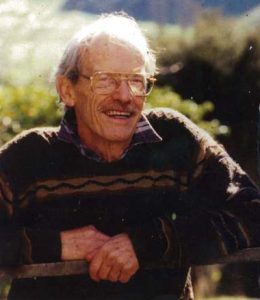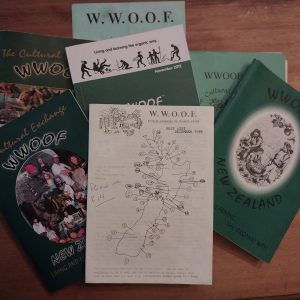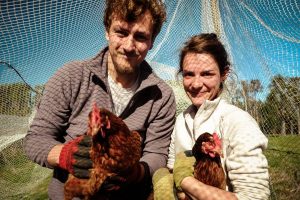
It’s WWOOF New Zealand’s 50 year anniversary! Starting with a handful of hosts on a photo copied sheet of paper and growing into the online directory of hosts and WWOOF visitors we have today. WWOOF UK began back in 1971 with Sue Coppard, a woman living and working in the city, wanting to get back to the land, so she organised weekends staying and helping on a farm just out of London.
The idea was quickly taken up by Dick Roberts and in 1974 he opened up his farm in Nelson for people to stay and learn about organic growing. By the mid 1980’s the little booklet had grown to 90 hosts and included sketches of organic farming. People would write letters from all over the world to get more information and we would send them an application form. Then they would fill that out and post it back and we would then post the book to them. Most members even back then were from overseas and all up it could take 2-3 months before receiving their precious WWOOF Book!
Mutual respect is key to the WWOOFing experience. WWOOFers, when arranging your stay with hosts, it’s not only important but also polite to honour your commitments. Hosts go the extra mile by stocking up on food supplies, planning engaging projects, and even turning away other WWOOFers based on prearranged arrival dates. Let’s ensure a harmonious exchange by valuing and respecting each other’s efforts.
Some disappointed WWOOFers have contacted us due to contacting Hosts with requests to stay and receiving few responses, often only to find out that hosts are either full or not taking anyone for the winter. Remember, a brief reply even if to say, sorry no, goes a long way to helping make plans. Use your calendar to show when you are booked and if you’re taking a break, consider switching your status to unavailable to avoid dashed hopes. You can do this through your settings, under the drop down menu on your profile.
WWOOF and MBIE Guidelines
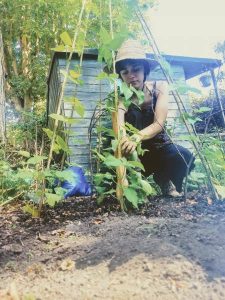 A reminder about aligning with MBIE guidelines regarding WWOOF farm stay experiences. Login to your host profile and check that you are clear your WWOOF visitors are not replacing employees but are here to learn and contribute in a hands-on environment and to participate in a cultural exchange with you and your family.
A reminder about aligning with MBIE guidelines regarding WWOOF farm stay experiences. Login to your host profile and check that you are clear your WWOOF visitors are not replacing employees but are here to learn and contribute in a hands-on environment and to participate in a cultural exchange with you and your family.
According to the government website, if you have a specific job to do that could help an inexperienced person gain new skills, you might be able to hire an unpaid intern. Offering an internship position isn’t just a way to get free help — you need to be sure that the person doing the work will benefit from it, even if they’re not being paid.
You can learn more about guidelines for taking on an unpaid intern at the following link: https://www.business.govt.nz/hiring-and-managing/deciding-to-hire/alternatives-to-hiring-an-employee/
If you decide to ask your WWOOFer to engage in income-producing activities on your property after they’ve spent time learning about your operations, they must be treated as employees, receiving wages and appropriate record-keeping. For further guidance, please refer to the resource provided by MBIE https://www.business.govt.nz/news/accommodation-for-workers-what-you-need-to-know/
In light of the “work and travel” landscape, do you think we should consider flagging places that could lead to paid work. This proactive approach will not only maintain our standing with MBIE but also ensure fair competition with other organisations offering similar experiences.
Working together to continue to create valuable experiences for both hosts and WWOOFers while observing government regulations is something we need to keep in mind.
We’ve received feedback from WWOOFers regarding fair expectations of working hours, with concerns raised about potential exploitation. To maintain the integrity of the WWOOF community, we encourage hosts to consider a reasonable timeframe each day. Some WWOOFers feel that the demands placed on them are excessive, and the value of their stay did not reflect the amount of hours they worked. This prompted discussions about setting clear guidelines.
We’d like your feedback on how to respond to WWOOFers about expectations.
If we use monetary value, a simple way of valuing someone, 20 hours a week comes to $463 and 25 hours is just under $579 based on minimum wage. This equates to around $90 or so a day which seems reasonable when compared to staying in short-term accommodation such as a backpackers. It’s been suggested that we establish this baseline for weekly hours of help to ensure fair treatment and prevent exploitation within the WWOOF community, which is one of MBIE’s concerns. Of course WWOOFing isn’t about money so does need to find good balance.
Creating your Host Profile
Crafting an inviting host profile is key to attracting compatible WWOOF visitors.
Describe your property. Tell your WWOOFers about your property. Share what makes it an appealing destination for people to visit and stay! Let your WWOOF guests get to know your place and don’t forget to tell them about the activities and projects you have going on.
Some tips and reminders to make your profile shine:
Highlight what visitors can learn and experience during their stay.
Explain your organic and sustainable practices.
Include activities available on your property or in the surrounding area to do in free time.
Spruce up your profile with engaging photos, depicting the activities , your home and surroundings and furry friends
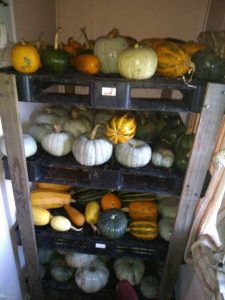 Showcasing your place: Having quality photos can make a difference in attracting WWOOFers to your host profile in the best possible light. The old saying, “A picture is worth a thousand words,” holds true in the world of WWOOFing. Add a variety of photos that represent your farm and the experiences you offer. Include images of the farm activities, surroundings, your home, the accommodation they will stay in, and, of course, the adorable animals. These photos not only enhance your profile but also make it easier for WWOOFers to envision themselves at your place, making them more likely to contact you.
Showcasing your place: Having quality photos can make a difference in attracting WWOOFers to your host profile in the best possible light. The old saying, “A picture is worth a thousand words,” holds true in the world of WWOOFing. Add a variety of photos that represent your farm and the experiences you offer. Include images of the farm activities, surroundings, your home, the accommodation they will stay in, and, of course, the adorable animals. These photos not only enhance your profile but also make it easier for WWOOFers to envision themselves at your place, making them more likely to contact you.
We can feature your profile on our social media platforms. If you prefer not to have your photos used for promotion, simply indicate so in your gallery.
Several WWOOF hosts have alerted us to unauthorised Facebook groups using our WWOOF name. These groups are exploiting the goodwill collectively built over our 50-year history in New Zealand. Not only is it disheartening to see Hosts’ and WWOOFers’ good will being illegitimately used in this way, WWOOF risks its reputation being damaged and it also causes confusion. We’re dismayed by the lack of respect shown. Those participating in these groups not only by-pass our official WWOOF New Zealand website, depriving our community of members (both hosts and WWOOFers), they also lack the protections and complaint mechanisms provided on our platform. It’s truly disappointing that some individuals feel entitled to engage in such actions.
We have resisted using Facebook as a place for WWOOFers and hosts to contact each other preferring use of the WWOOF website and messaging system. There are a number of concerns with Facebook such as privacy, Facebook can shut you down or change its rules for no apparent reason, Facebook directs members away from the WWOOF website, data is being used, sometimes for questionable uses, not everyone uses Facebook and when you build a group on Facebook, you don’t own it, Facebook does.
Unfortunately due to the misuse of the WWOOF trademark created by these Facebook groups it’s become a legal issue of trademark protection.
Ideas for Website Updates
As our WWOOF website celebrates its tenth anniversary, it might be time for makeover. We have the option of working closer with WWOOF Australia and using the system they have which would mean WWOOFers can carry their feedback with them when WWOOFing between the two countries.
We welcome your ideas for improvements. Some suggestions have already been made including:
- Categorising your saved profiles and searches.
- Introducing tags to indicate last-minute WWOOFing opportunities.
- More search filters.
- Exploring the possibility of hosts posting on a legitimate NZ Facebook group to combat unauthorised WWOOF sites.
- Include a response rate to encourage replies.
We invite you to share your WWOOFing stories and photos with us on social media. Tag @wwoofnz on Instagram, mention WWOOF on Facebook and share your experiences.
The WWOOF Team.


